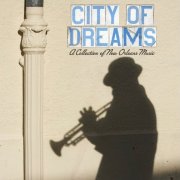 With the temperature dropping, it's time to find someone to keep you warm. Find your hookups with our online dating guide!
With the temperature dropping, it's time to find someone to keep you warm. Find your hookups with our online dating guide!
City of Dreams: A Collection of New Orleans Music
- Jazz/Rock/Blues
- 2007
- Buy the CD
Reviewed by Mojo Flucke, PhD
()
The Crescent City's rhythms are unique to the city, a stew of African and Caribbean beats that manifest themselves in the stop-time, third-line rhythm and blues that infuses everything from the hardest, most serious jazz to the lightest pop that emanates from the area. Few American cities can boast such a singular sound -- when one hears it, it doesn't matter if the musician is black, white, brown, old or young, you can tell it's N'Awlins. Motown, Philly, Memphis, and even Kansas City had their moments, but they came and went. In New Orleans, it's in the water. Once it takes hold of a musician, they can't move on. And, thank you very much, please don't confuse New Orleans rockin' rhythm & blues with cajun or zydeco music. It's not here. You’ll find it elsewhere in the Rounder catalog, but don't be buying this box looking for more from Beausoliel or similar artists. You've been warned.
Rounder Records and its independent spirit played a huge role in the preservation of New Orleans' music, pre-Katrina. In the early 1980s, the major labels had their fill of New Orleans after its 1950s-70s heyday (think "Lady Marmalade" from Labelle and "Right Place Wrong Time" from Dr. John) and left the community pretty much for dead, with the exception of the Marsalises (dad Ellis, and sons Wynton, Branford, Delfeayo and Jason) and the Nevilles. It was Rounder's youthful (at the time) brass who stepped into the breach and recorded the living legends like Clarence "Gatemouth" Brown, Professor Longhair, Champion Jack Dupree and James Booker, as well helping build and sustain the careers of singers like Irma Thomas and Marcia Ball. And let's not forget their role in getting the Dirty Dozen Brass Band a national "NPR" following to augment their wild regional popularity. Not only did Rounder record new material, they reissued some long-lost old sides that couldn't have made a penny.
The cream of these recordings are catalogued here, a nice mix of '50s-style R&B, jump boogie, jazz, solo piano, country-soul rock, straight blues, and that crazy, one-of-a-kind Mardi Gras brass-band street music. Disc Four spotlights the doctor-professors -- the piano maestros of the club scene like Longhair, Booker, and Tuts Washington. Few know of Booker, but some piano scholars will argue -- and might win -- that he's an all-time, top-five American keyboard player. Art Neville, the oldest of the Brothers and the most recorded from the 1950s to his seat in the Meters to the Neville Brothers and beyond, has a track ("My Children") on this platter. Certainly he and Booker are among the most gifted-yet-unappreciated keyboard players in the rock era. Another disc is devoted to driving post-Meters funk, a New Orleans original that persists to this day -- they don't let go of a good thing down there -- that includes "Ain't No Yachts in the Ghetto," sung by Theryl "Houseman" de'Clouet (better known as the former lead singer for Galactic) with a middle section rapped by Menace. Dr. John shows up on this disc, too, as well he should, in "Keeper of the Crown" with Bo Dollis and Willie Tee. The funk from New Orleans isn't like, say P-Funk; they work in a lot of that Mardi Gras rhythm, and go lighter on the bass, putting more emphasis on the rhythm guitar. It's more sophisticated, jazzier, and stands up well to repeated listenings.
One could legitimately beat on Rounder for its endless anthologizing and sampling of its catalog for promotional purposes (20 years ago, I came to know many of these artists via one of its early anthologies, Louisiana Scrapbook), and they might be right. Yet it also could be said that the label's a tireless promoter of music that needs to be heard -- and will never be heard on commercial radio -- and these samplers are the only way to keep them out there. This box promotes some of the same old stuff we've been hearing for a quarter century, it's true. But post-Katrina, this box serves as a record of what was and in a few cases, what still is. The musical culture, just like a lot of people and other parts of New Orleans, is struggling to survive in the wake of the hurricane. In assembling this box, Rounder's doing it's part to rebuild -- and remind us --of the city's singular musical legacy. If they make a buck or two in the process, we should just thank God it's not going to Sony.
You can follow us on Twitter and Facebook for content updates. Also, sign up for our email list for weekly updates and check us out on Google+ as well.











